BlueFUTURES 5: Portals to BE trends to watch in 2022 and beyond
Reflecting on the Accelerator Lab for Barbados and the Eastern Caribbean’s journey for 2022 thus far, I wished to start with the value of the Lab network and our transition and evolution framed under the lens of continuous Research & Development (R &D). Some of the key elements of the early stages of an innovation cycle include our continued work to explore and discover research questions to developing and testing prototypes and then sharing our learnings for diffusion and impact.
A part of this journey looks to where the Lab fits into the wider UNDP business and strategic innovation discussions and strategies, how and where it fits within our Multi – Country office, Government, partners and stakeholders and why our roles of wearing hats such as solutions mapper, explorer and experimenter to name a few are key to reimagine development.
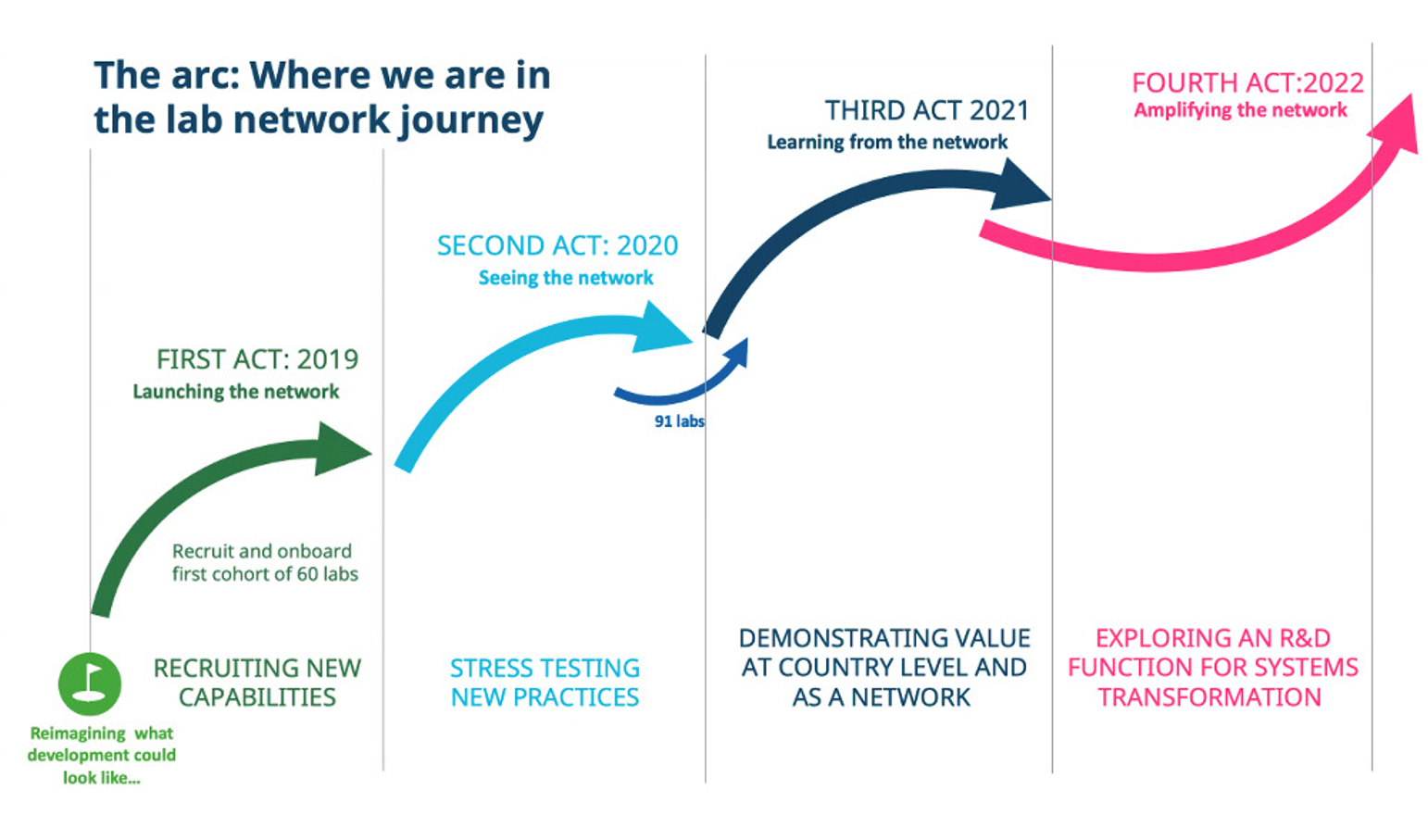
Some of the Explorers Group has recently begun discussing our value proposition as the Accelerator Lab but also more specifically as Explorers and how we view the fluid roles between the Acc Lab team where at times, many of us wear all hats: from Solutions Mapper to Experimenter to Explorer. As Resident Explorer, one of my key roles is to anticipate alternative futures based on current trends, learnings and insights. As change continues to happen rapidly, it can feel both a challenge and opportunity to be able to keep up to find solutions faster to accelerate development.
As we aim to encourage and enhance an innovation culture, mindset and ecosystem, especially in the Blue Economy in Barbados and the Eastern Caribbean, it is important to look at the use of some of the new and diverse data sources, innovation methods and approaches such as horizon scanning and sensemaking and how these have helped us to determine current trends, insights and learnings for behavioural change.
In this blog, I invite you to join me on a deep learning dive (or maybe more of a shallow swim) as we explore the potential opportunities in the Blue and beyond – what may the Alternative Blue Futures look like and how may anticipating these futures help us to better explore to find solutions faster to get ahead of the curve to accelerate development?
Let’s start in the Ocean – the heart and lungs of the Planet. It is what connects us all. The Ocean is life. It is biodiversity – coral, algae, fish, whales. It is jobs, livelihoods. The Ocean is leisure, recreation and sports – swimming, diving, surfing, sailing. It is health, wealth, well–being. It is coastline protection. The Ocean is economic diversification. It is tourism, renewable energy, waste management, transport, ports & shipping. The Ocean is innovation, biotechnology, data, medicine. It is history, culture, tradition, creativity, spirituality. The Ocean is restoration, regeneration, revitalization. The Ocean is resilience.
Covering 70% of the Earth’s surface, producing over half of the World’s oxygen, providing the air that we breathe and absorbing 50 times more carbon dioxide than our atmosphere, the Ocean helps to regulate our climate. The Ocean is the heart of the Blue Economy, a trillion - dollar industry globally which is one pathway to achieving sustainable development – with economic, environmental and social impacts.
The Blue Economy for Green Islands approach for Economic Diversification, Job Creation and Resilience is at the core of the work that we do at UNDP Barbados and the Eastern Caribbean, and the Accelerator Lab. One of 91 Labs in 115 locations around the World, the Accelerator Lab in Barbados and the Eastern Caribbean encourages a culture of learning through a Blue Economy innovation ecosystem, driven by continuous Research & Development (R & D), testing, piloting of what works and what does not through co–created grassroots solutions. From community to cabinet, a key focus of the Lab is on behavioural change and mindset shift through investing in seed funding for learning while creating a culture that encourages innovation. By looking at the early stages of an innovation cycle, from the discovery of research questions to the development and testing of prototypes, this allows eventual diffusion of learnings and scaling for impact.
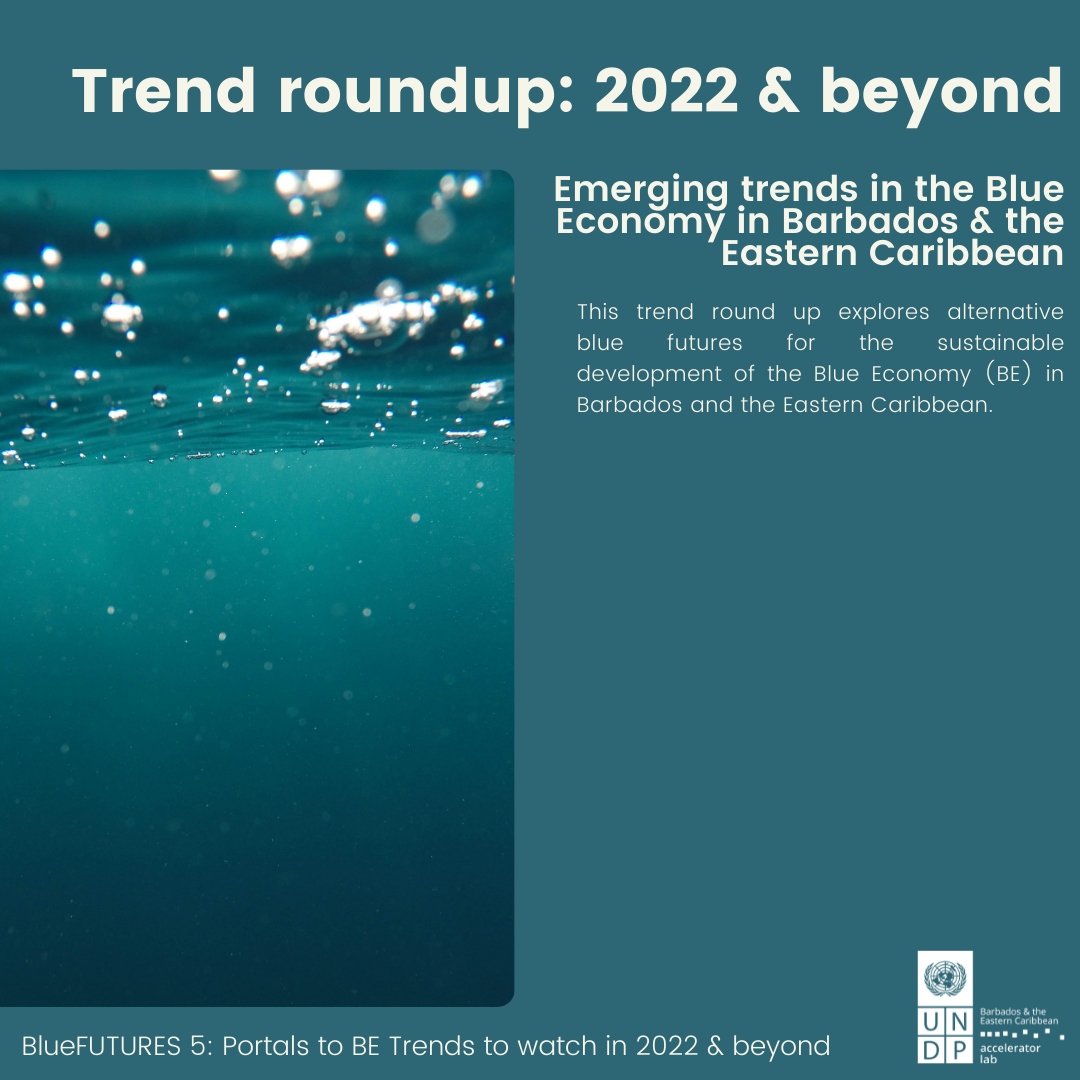
Through innovation learning as the lens, I aim to anticipate emerging trends in the Blue Economy in Barbados & the Eastern Caribbean and explore the alternative blue futures for sustainable development of the Blue Economy such as these trends and insights in the following mini trend round up: BlueFUTURES 5 – Portals to BE trends to watch in 2022 & beyond.
Ocean Action as Climate Action
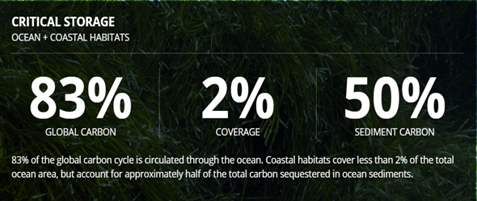
IUCN: https://www.thebluecarboninitiative.org/
The tide is rising but it is also turning and many of the non – extractive values of the Ocean are being further realized, like its role in climate action. The narrative on giving the Ocean the attention it deserves for its’ many important roles, with a focus on its contribution to climate change mitigation and adaptation is finally being prioritized by some but is this enough? From exploring and following blue carbon, this trend focusses on how the ocean and coastal ecosystems such as mangroves, tidal marshes and seagrass meadows can reduce the impact of greenhouse gases on the atmosphere by sequestering, taking in and storing carbon deposited by vegetation and natural processes over time and thus removing carbon dioxide from the atmosphere.
Mangroves are of particular interest as they store up to five times as much organic carbon as tropical forests. Surely then, this is enough to invest in solutions that prioritize restoration efforts or perhaps the allure and elusiveness of mangroves does not provide enough evidence that there could be Gold in Blue Carbon and that by following the carbon, you are following the money? Regardless of the answer, mangrove restoration solutions such as the Graeme Hall Nature Sanctuary in Barbados and the Ashton Lagoon restoration in Union Island, St. Vincent and the Grenadines are ways in which the Blue Economy is joining the fight against the climate crisis and I hope that we will soon see more of these initiatives getting the interest and attention they deserve.
Ocean Wellness
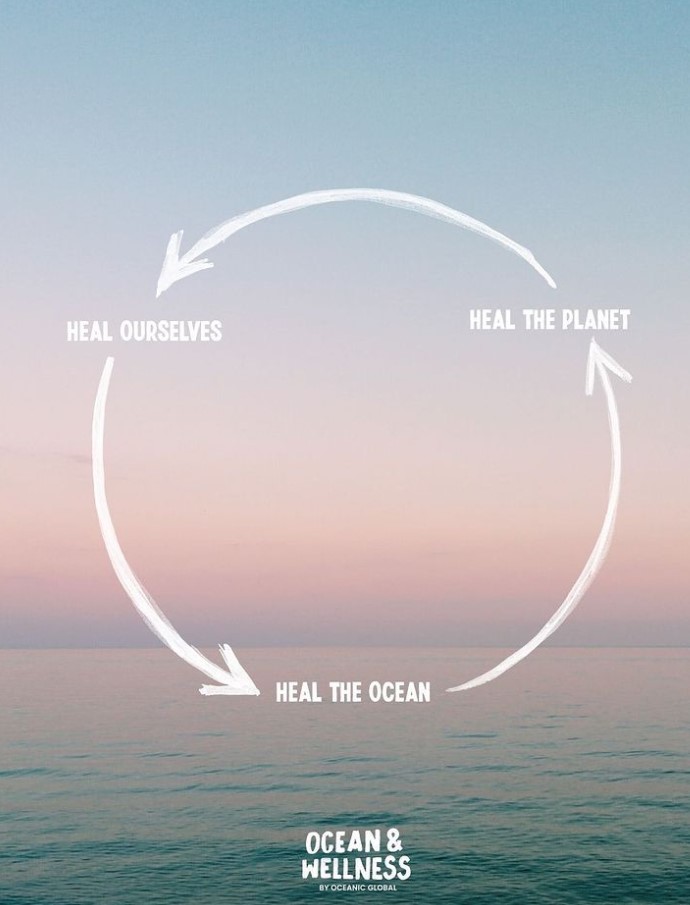
Oceanic Global. OCEANIC GLOBAL (@oceanic.global) • Instagram photos and videos
Ocean wellness is an emerging trend where focus is placed on restoring, regenerating and revitalizing ocean health but also the role of a healthy ocean on human health. This trend has the potential to find a better balance between ocean health and wealth, people and planet. By restoring, regenerating and revitalizing the blue and green planet – we are nurturing it and by extension nurturing ourselves. Revitalizing the Ocean and everything that it sustains looks to internal healing and planetary healing as deeply interconnected. Ocean action is climate action, but it is also action for our collective wellbeing. As the theme for the United Nations World Oceans Day 2022 is Revitalization : Collective Action for the Ocean, I am excited to both be personally and professionally advocating for Ocean Wellness and co – designing a series of micro events across the region to spread further awareness on this.
The Tide of Technology: Digital and Data
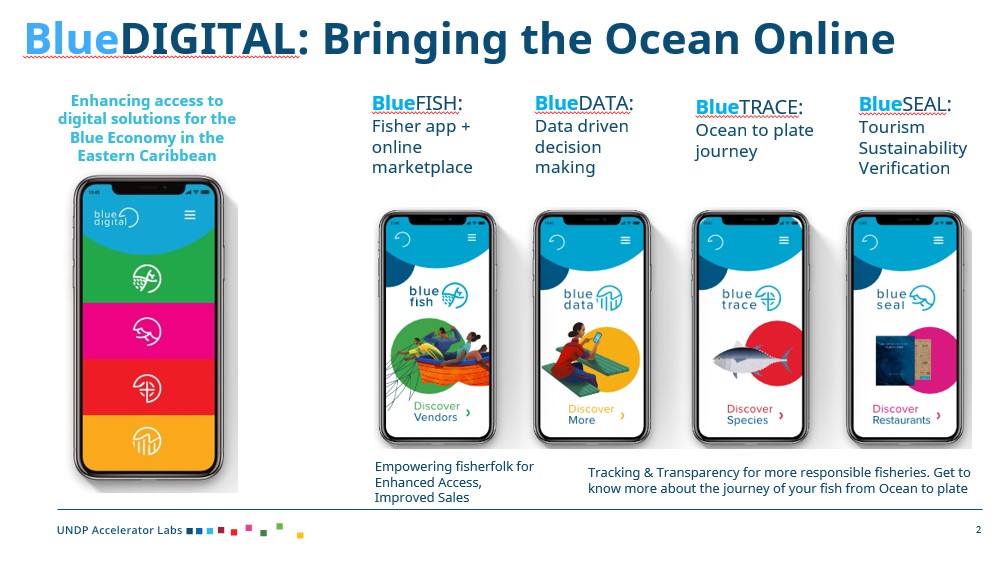
There are many emerging trends and insights surrounding digital transformation in the Blue Economy in Barbados and the Eastern Caribbean as well as on digital aiding development in Small Island Developing States (SIDS), especially in key sectors such as fisheries, tourism and crisis response. From the use of new and diverse data sources in fisheries traceability such as satellite tracking to geodata to blockchain to the use of robotics, artificial intelligence and machine learning to blue blockchain for carbon credit trading platforms, there are opportunities for communities to leverage marine data and create digital public goods while also exploring the use of Non – Fungible Tokens (NFTs) by creatives for conservation and tapping into the emerging metaverse.The Accelerator Lab is currently engaging with and leveraging this emerging technology trend through its’ BlueDIGITAL Project where the role of data and digital are acting as catalysts for development.
However, as I explore research questions surrounding technology, data and digital trends, finding the balance between the positive and potential negative impacts of these trends must be factored in. From data mining to data governance and ethics, questions, conversations and actions surrounding the impacts on our environment as well as intellectual property, security and the digital divide are at the fore and must be further highlighted in order to leverage a SIDS digital advantage .
As the value of digital and data as key assets continues to be realized, the shift to data driven storytelling, decision - making and policy making is garnering much interest and discussion with some of these key aspects being front and centre in development discourse providing an opportunity to scale learnings across SIDS.
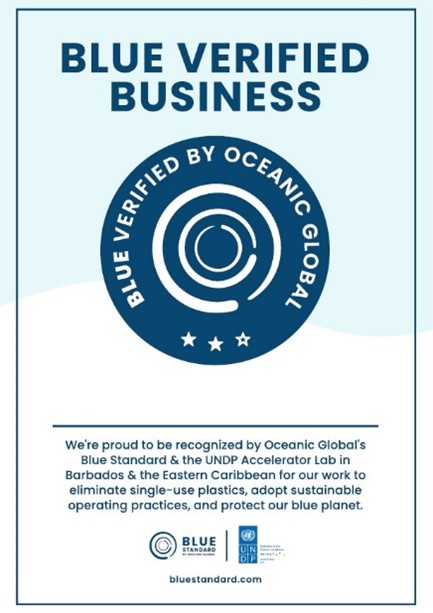
Blue Tourism
As the World learns to adapt to the new normal and travel largely resumes, the trend of blue – green tourism is increasing. From tourism sustainability verifications such as the Accelerator Lab’s BlueSEAL in collaboration with The Blue Standard – Solutions Exist to carbon – neutral travel and carbon offsetting, these trends are being leveraged to help support the diversification of the sector, especially in tourism dependent nations and regions, such as the Eastern Caribbean.
Initiatives that promote sustainability efforts such as local consumption through fisheries traceability contribute to food security while those that encourage community - based tourism while respecting traditional and authentic experiences are being enhanced. The continued interest in remote - working opportunities in the Eastern Caribbean including the Barbados Welcome Stamp has helped to drive and support these authentic and sustainable initiatives where digital nomads and expats wish to integrate within the societies that they now call home leaving a positive footprint and legacy.
Ocean Biomimicry
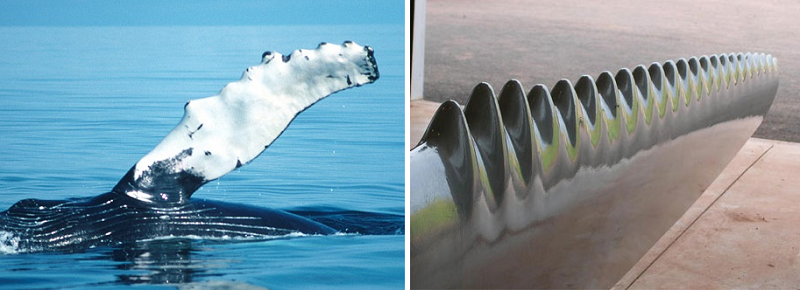
Image source: Inhabitat
As I have been enjoying sightings of humpback whales in Barbados over the past weeks, there have been many moments of finspiration. Although not new, nature inspired innovation and learning from nature's models appears to be more in the spotlight than ever.
Biomimicry: doing it nature's way - when humans imitate nature to solve complex problems through innovation and design that can often lead to more efficient and environmentally-responsible designs and processes. Most of what we deem human innovation has actually been ‘invented’ by nature in some shape or form, over and over again, yet it appears as though we are only now truly getting a grasp on the diversity of solutions to be found in nature.
So what does renewable energy, and more specifically a wind turbine have in common with a humpback whale? Using the same shape and ridges on the pectoral fins of a humpback whale, the blades of wind turbines continue to generate maximum amount of energy thanks to inspiration from nature - in this case, the aerodynamic flow of whale fins in water transferred to the hydrodynamic advantage of the wind turbine.
If that does not interest you, perhaps you are a Formula 1 fan and curious where many of the design elements, including the return of serrated rear wings of the cars due to new regulations got their inspiration from? This is another example of biomimicry where the reported journey started in 2014 with Mclaren using the trailing edge of the mainplane and leading edge of the upper flap with knuckle shapes carved out, inspired by tubercles, the small nodules found on the dorsal fin of humpback whales, which improve manoeuvrability. This idea has since evolved and been re-purposed on different parts of these cars showing that there is still life in many of these older ideas.
Many other marine biomimicry and nature biomimicry examples abound so perhaps next time you look outside, you may see one. As I continue to explore trends in the Blue Economy, one item on my radar for the Lab as well as innovators in the Eastern Caribbean is a marine biomimicry challenge with the Biomimicry Institute using lessons learnt from other Labs.
As I continue to explore alternative blue futures, my main guiding compass is that of balance - for planet, for people. Any solutions must take into account both ocean health and wealth and be driven from community to cabinet. As stewards and champions of the Ocean, communities possess invaluable knowledge and traditions that must be placed at the centre of development to allow for marrying of the old and the new as we use technology for social good. At our Lab, we continue to collaborate with communities at the grassroots level to co – design solutions for accelerated development.
As the Blue Economy moves from concept to reality, the role of the Ocean and its vast potential and value, both extractive and non–extractive, is being further realized with greater focus being placed on the latter. Although the full potential of the Ocean has not yet been fully realized, those barriers to reducing opportunities and benefits are being replaced by solutions driven by experimentation. With survivability sometimes being a catalyst for change and innovation, many countries have moved to a sustainability frame of reference with others now transitioning to restoration and regeneration for greater resilience. From Small Island Developing States (SIDS) to Big Ocean States (BOS), the wealth of Ocean resources and their contribution to the global economy will continue to shape a Blue Economy for Green Islands.
Within the Accelerator Lab innovation ecosystem, the Lab will continue to be an ecosystem builder finding entry points in the system to create behavioural change with a ripple effect for scaling and impact.
As explorer, innovator, oceanpreneur and advocate, I continue to seek out trends and gather insights to keep relevant and to anticipate the alternative blue futures as we find solutions faster to learn quicker to accelerate development for impact. Being agile in exploring new solutions through testing, iterating, learning and adapting requires a further push to become more responsive through a culture shift.
Stay tuned for more from BlueFUTURES 5: Portals to BE trends to watch in 2022 & beyond.
Happy reading, learning and sharing ~
Written by Nikola Simpson, UNDP Accelerator Lab in Barbados and the Eastern Caribbean with inputs from Shara Spencer, UNDP Barbados and the Eastern Caribbean Communications Team.

 Locations
Locations